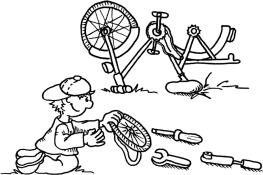Futur II – Future Perfect in German Grammar

The future perfect (Futur II, vollendete Zukunft) expresses the assumption that an action will have been completed by the time of speaking, or by a particular point in the future.
Master the future perfect tense with Learning German app.
Example

- Warum baut Matthias sein Fahrrad auseinander?
- Er wird wohl gestürzt sein oder eine Panne gehabt haben.
- Oh nein, wir wollen in einer Stunde eine Radtour machen.
- Keine Angst! Bis dahin wird er das Fahrrad repariert haben.
usage the future perfect in German
We use the future perfect to express:
- an assumption about an action in the past
Example: Er wird wohl gestürzt sein.
Er wird eine Panne gehabt haben
- an assumption that an action will have been completed by a certain point in the future (you always need an indication of the specific time here, so you know you’re talking about the future)
How to conjugate German verbs in the future perfect
To conjugate verbs in the future perfect tense, we need the finite form of werden, the past participle of the full verb, and the auxiliary verbs sein/haben.
| person | form of “werden” | full verb + sein/haben | |
|---|---|---|---|
| 1st person singular (ich) | ich werde | gegangen sein aufgewacht sein |
gelesen haben gedacht haben |
| 2nd person singular (du) | du wirst | ||
| 3rd person singular (er/sie/es/man) | er wird | ||
| 1st person plural (wir) | wir werden | ||
| 2nd person plural (ihr) | ihr werdet | ||
| 3rd person plural/polite form (sie/Sie) | sie werden | ||
Past Participle
The past participle (Partizip II) is formed in two different ways depending on whether we are conjugating a strong verb (ge…en) or a weak/mixed verb (ge…t).
| type | conjugation | |
|---|---|---|
| weak | ge…t | lernen – gelernt |
| strong | ge…en | sehen – gesehen |
| mixed | ge…t | denken – gedacht |
Exceptions
- Many strong and mixed verbs change their stem in the past participle. (see list of strong and mixed verbs)
- Example:
- gehen – gegangen, bringen – gebracht
- If the word stem ends in d/t, we add an -et to weak and mixed verbs.
- Example:
- warten – gewartet
- Verbs that end in -ieren form the past participle without ge.
- Example:
- studieren – studiert
- Inseparable verbs form the past participle without ge.
- Example:
- verstehen – verstanden
- With separable verbs, ge goes after the prefix. (see separable and inseparable verbs)
- Example:
- ankommen – angekommen
At last you can now use future perfect in German Grammar. In addition download German Keyboard translator for fast and accurate translation.




























